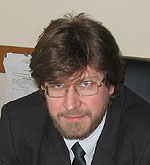 Differences in the interpretation of the Beslan hostage drama
Differences in the interpretation of the Beslan hostage drama
by Russia and the West could well drive a wedge between the two
sides, reducing relations to their lowest point since the demise of
the Soviet empire.
Vladimir Putin’s meeting with western journalists and policy
experts was supposed to crown the long-planned international
conference entitled ’Russia at the Turn of the Century: Hopes and
Realities,’ held under the aegis of RIA-Novosti and the Council for
Foreign and Defense Policy.
In the wake of the tragic events in Beslan the routine event turned
into a political event of international importance, likely to play
a crucial role in shaping Moscow’s future relations with the
leading Western capitals.
Many delegates admitted they had been most impressed not by what
Putin said at the conference, but how he said it —
confidently, vigorously, with conviction.
In the course of Putin’s presidency Russia’s relationship with the
West has seen several stages. By the beginning of his second term
in office it became clear that no legal or ideological integration
of Russia into the western world, so much hoped for in 1990s, had
taken place.
Due to various reasons the European choice, declared a decade ago
and reiterated with Putin’s advent to the Kremlin was never
implemented. On the contrary, the socio-political model of modern
Russia is moving further and further from western, especially
European, patterns, representing a mixture of tradition of Russian
autocracy, far-eastern concepts of authoritarian modernization and
individual elements of liberal democracy.
Whether the western state system could triumph in Russia in late
20th and the early 21st centuries is another matter for discussion.
One way or another, it has never happened.
Quite recently western partners actively sought to contribute to
Russia’s transformation, but now they have restrained their ardor.
At any rate, the first half of this year saw changes in the
relations between Russia and the European Union, relations in which
the humanitarian component has hitherto prevailed.
The parties switched from the bickering caused by differences in
interpretation of democracy and human rights issues to a practical
bargaining on more specific issues of interaction. In relations
with the US that change occurred even earlier when Bush famously
“looked into Putin’s eyes” in Ljubljana, and then Putin decisively
supported Bush in the wake of 9/11.
Moscow, on its part, hailed the transfer to a new form of
relationship, which suggested that the Russian state would
guarantee that the West’s key desires, first and foremost, oil and
gas, would be satisfied, while Russia’s internal affairs would be
none of its western partners’ business. Actually, that model is
quite viable and has been successfully tested with many
countries.
However, the issue of ’values’ is again being raised; moreover,
this time it is Russia that is set to initiate the
discussion.
Regardless of the monstrosity of the latest terror attack in
Russia, neither the US nor Europe seem to have revised their
approach to the beginnings and instigators of the Caucasian
conflict. It is hardly a coincidence that EU officials are so
insistently demanding an explanation from Moscow.
The more terrible the actions of the terrorists, the more convinced
is the West that Russia must revise its Chechnya policy seen in the
West as the root of all Russia’s tragedies.
Russia, on the contrary — not only the leadership but also
most ordinary Russians — sees the Beslan drama as the final
blow to the idea of talks with the leaders of the self-proclaimed
independent Ichkerian republic.
And this is a question of ’values’, as Vladimir Putin told his
foreign guests at his residence in Novoogaryovo: child-killers and
their accomplices have lost their right to anything.
The differences in interpretation of the events in Beslan by Russia
and the West are likely to sow the deepest discord between Russia
and the West since the collapse of the Soviet Union.
It is no secret that many members of our political establishment
still view Russia as a great power, encircled by enemies.
Putin’s vague allusions to those who incite terrorists, included in
his address to the nation, were reiterated in Novoogaryovo. The
president rebuked the West for regular meetings with leaders of the
Chechen underground and its unwillingness to call them
murderers.
The response came the next day. Richard Boucher, spokesman for the
State Department, pledged the US would continue meeting Chechen
separatists, noting that the US’ views on certain ’political
figures’ differs from that of Russia.
This statement paves the way for a strengthening of positions by
Moscow ideologists who have long been calling for the erection of
’Fortress Russia’.
Is the transition to the ’pragmatic’ model mentioned above possible
in this situation? Basically, yes, even more so as our
establishment is by no means ready to sever ties with the West
completely. Admittedly, that model only works provided it is based
on the authorities’ ability to ensure stability.
Destabilization casts doubt on the basis of any interaction.
In the course of a decade of the Chechen war we have seen many
terrible incidents, and yet those were individual acts perpetrated
at lengthy time intervals, not connected with one another directly.
Today Russia faces a large-scale campaign, with one blow following
another.
A real terrorist war is, for instance, what has been unleashed more
than once since the early 1970s by Palestinian extremists or the
fighters of Irish Republican Army in the early 1970s and 1980s.
Something similar, although on a lesser scale, happened in Germany
in the late 1970s, where left-wing radicals sent shockwaves across
the country.
This is a durability test both for the state and society, while no
one in Russia seems ready to undergo that test, of which much has
already been said and written. It is worth adding that the
inability to rein in the terrorists will also disrupt the country’s
foreign policy.










